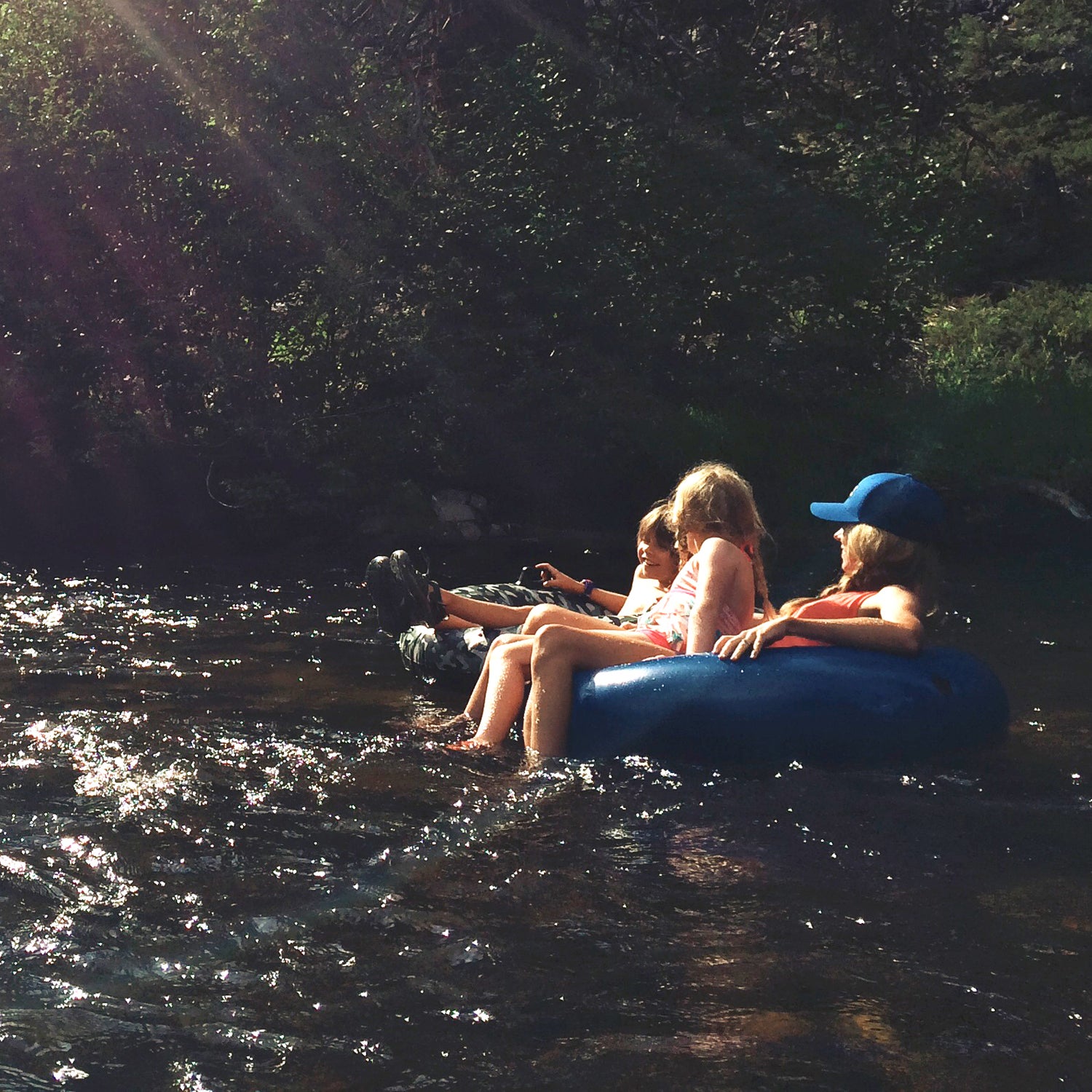The other day, while reading an article entitled “”��in the New York Times, I kept being interrupted by my children.��
First, my four-year-old wanted a snack. I offered her sliced apples. “NOOOOO,” she wailed like she was being tortured. “I want grapes!” A little while later, she emerged naked and dripping wet, from the hot tub, and asked me to tie her towel in a complicated, knotted hood around her head. I tied it the best I could. She hadn't taken two steps when it drooped down around her bare shoulders. A few minutes later, she appeared again, sniveling that the dog had stolen her Easter candy. No wonder. The house was strewn with plastic Easter eggs that outgas nasty chemicals and that horrible fake green staticky Easter basket grass, like a Chinese Easter egg factory had exploded in our living room.��
This type of situation isn't all that unusual in our household. I can't remember the last time I read an entire article from start to finish in one sitting. The irony is that the story I was trying to read, by Teddy Wayne, documents the growing movement among those of childbearing age to remain childless. Much of the article references essays from the new anthology on the same topic, .
The New York Times reports that 15 percent of women between the ages of 40 and 44 are childless, a figure which has more than doubled since 1976. Not all have chosen this, but those who have (the CDC puts that figure at )��are becoming more confidently outspoken about their decision, once viewed as antithetical to womanhood, detrimental to humanity, and, as the title suggests, innately selfish. The movement is growing. Starting in 2013, after a 20-year hiatus, August 1 was declared International Childfree Day, crowning the Childfree Woman and Man of the Year. And this October, the inaugural will kick off in Cleveland.��
After I became pregnant with my first child, I felt a deep, primal grief for something I would never get back: me, unfettered.��Seven years later, I love my daughters beyond reason.
Choosing to remain childless is perhaps the most personal and profound decision one can make in life. There are as many reasons not to procreate as there are people in the world, and the book's essayists write passionately about their own reasons, which range from the practical to the existential. There are the painful memories of neglected childhoods, the fear of losing one's freedom, health issues and financial concerns, the fierce desire to remain independent and creative. Then there's the abhorrence of fancy strollers and overpriced pre-schools with long waiting lists, the unconscionable amount of plastic crap (see: Easter eggs, above), and the trepidation at joining, as essayist Tim Kreider writes in the anthology, the “brainless docile hordes helplessly breeding.”��
“The mothers I met struck me as a strange and unenviable breed: harried, hampered, and resentful,” writes cultural critic Laura Kipnis, who imagined feeling “weighted down and immobilized” by motherhood. Fiction writer Elliot Holt recalls her cumbersome experience pushing her infant nephew in his jogging stroller like this: “I don't want my running stride—or anything else—hampered by children.” Lamenting the “commodification of childhood,” Anna Holmes confesses, “that terror, that utter horror, had very little to do with feelings about children and everything to do with…my hunger to do things…and carve out a special space in the world in which I could find my authentic self.” I'm familiar with this fear because after I became pregnant with my first child, I felt a deep, primal grief for something I would never get back: me, unfettered.
Seven years later, I love my daughters beyond reason. The way writer and proud non-parent Pam Houston describes her love for the physical world—it “threatens to break my heart every minute”—in the anthology, is the way I feel about my kids. But like most parents, I'm mostly fumbling along, often confused, sometimes harried and resentful.
I support anyone's choice not to have children. The planet is a crowded place with limited resources, and certainly the decision merits grave consideration and is no one's business but one's own. But being a parent has given me perspective that might be reassuring, if not persuasive, to those still on the fence. I have learned that it's possible to raise kids responsibly without spending an exorbitant amount of money, without driving an enormous car, and without drowning in plastic. It takes more effort, but you can still be yourself. You can still have a life. Here’s how:
1. Get Out There
“Serious travel makes me feel in relation to the world in an utterly essential way,” explains Houston in her anthology essay, “The Trouble with Having it All.” For parents bitten by the adventure bug, the yearning to wander doesn't dissipate when babies come along; if anything, it intensifies. The good news is that kids are portable. My recommendation: Start early and go often. This is training as much for you as for your children. Flying, jet-lag, fussy kids—they’re not as hard as you think and they get easier with practice. We started taking river trips in the Southwest with our girls before they turned one. The first few outings were so stressful I was sure I would have a nervous breakdown. But now our whitewater expeditions feel like second nature. Other families take sabbaticals, live in VW camper vans, or sail around the world. You might not rack up 100,000 frequent flyer miles a year like Houston, but it's still possible to explore the world with children, and almost always a rich experience seen through their eyes.��
2. Don't Sweat the Plastic Stuff
No matter how staunchly opposed you are to toys made in China, well-meaning people will give you plastic My Little Pony and microscopic Lego sets, and your children will play with them, and you will feel secretly grateful for the few minutes of peace and quiet they've given you, and you will decide that, in the scheme of things, it's not really such a big deal. Before our first daughter was born, our friends bestowed upon us a horrendous automatic swing made of plastic, which we immediately and smugly banished to the garage. Then we came home with a squalling baby wolverine-child who would not sleep without being rocked and swaddled. We set up the swing. It looked like hell in our living room, but Pippa—and later her sister—slept peacefully for hours in that contraption. When they outgrew it, we gave it away. Gone. It's that easy. Once a month, enlist the kids to help purge the toy bins and donate to those in need. Your minimalist obsession equals their real-life lesson in sharing and compassion.
3. Embrace Being the ‘Loser on the Bike’��
In his essay “Over and Out,” included in the anthology, writer Geoff Dyer describes himself—a childless man—through the eyes of fancy mums speeding along to “the extremely expensive private school on the corner” as “some loser on a bike.” Those same parents, posits the New York Times' article, “typically own larger cars and use up more resources.” Guess what? Just because you have kids doesn't mean you can't still be the loser on a bike! You just need a bigger bike. For kid-toting and errand-running, we're partial to our Radish cargo bike, with roomy storage bags and a platform long enough for two. Riding it to school and back with the wolverine and her sister saves gas and makes me feel free, like I'm a kid again, too. Because that's where Dyer missed the bigger picture: Becoming a parent raises the stakes and gives you more incentive, not less, to act responsibly on behalf of the environment. Just try imagining what kind of future your four-year-old will face in 30 years.��
4.��Be True
“To abandon a child in favor of one's personal desires or ambitions…is, in my view, to commit the worst sort of crime,” writes non-fiction writer Rosemary Mahoney. She's referring to taking two weeks away, or even two hours, from your children. I'd argue the opposite. To not go after what you want and who you are is like hopping the express train to burnout. Being selfless is not sustainable. Try hard to do something for yourself, that you love, every single day, whether it's a taking walk or a run or playing the piano. I started ultra running after our second daughter was born, and moving through nature on my own two feet, unhindered, has allowed me to be my authentic self and helps me be a more patient and present parent when I get home.
5. Roll with It
The Times' story cites recent studies finding that parents are happier than non-parents, and that non-parents are happier than parents. I only have to look to my own existence with children, and those of my friends, to know that these conflicting reports pretty much sum it up. Some days, I'm ecstatic, other days grumpy and annoyed, wishing I were on expedition to Everest or living with my chimps in a hut in Tanzania like Jane Goodall. Such is life. As a wise friend told me when I was pregnant, “Don't bother worrying about a thing. The things you think will be easy will be hard, and the things you think will be hard will be easy.” On the good days, it feels almost possible to reinvent parenthood, to put our truest efforts into, as novelist Paul Lisicky writes, “trying to be present…now and now and now and now.” Which is the very best gift we can give our children, and ourselves.


